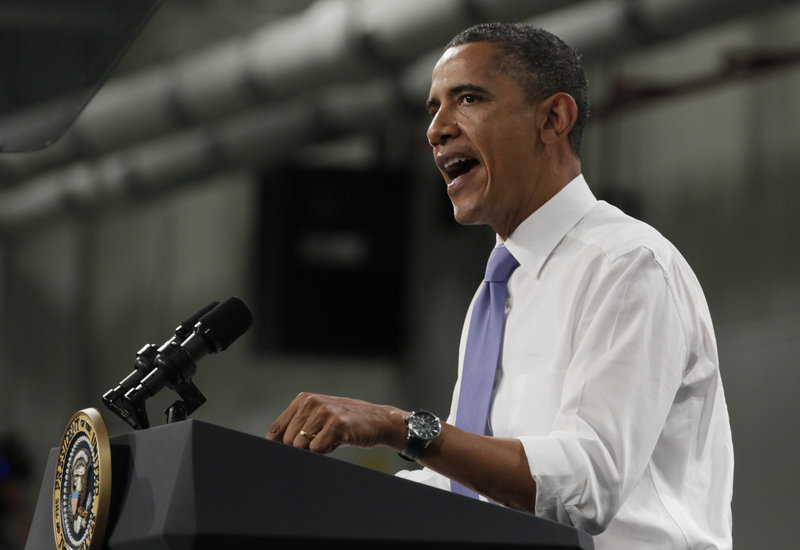U.S. stock markets rebounded sharply Thursday, continuing a volatile week driven by financial trouble in Europe and frustratingly mixed signals about the direction of the U.S. economy.
On the day, a drop in jobless claims and strong corporate profit reports helped major exchanges regain some of the ground lost since last week’s market-shaking downgrade of the U.S. government’s credit rating. The Dow Jones Industrial Average added 423 points, or nearly 4 percent, after the Labor Department said that new requests for unemployment benefits had fallen below 400,000 for the first time since April.
But there was also sobering news for the White House: a drop in exports that pointed to a slowing global economy and cast doubt on the Obama administration’s hope that overseas sales by U.S. companies would reinforce the country’s recovery. With Europe sputtering and China’s rapid growth beginning to ebb, U.S. exports fell more than 2 percent from May to June as other countries curbed their purchases of equipment, industrial supplies, food and other goods.
That will add to concern that the U.S. economy may slip back into recession, the “double dip” that the Federal Reserve and the administration have been fighting to avoid. Among the troubling trends: slowing growth, a drop in household spending and equity markets whose recent volatility is reminiscent of the early days of the 2008 financial crisis.
In Holland, Mich., President Barack Obama blamed the recent whipsawing of markets on the gridlock over how to deal with the nation’s massive public debt. The stalemate led the Standard & Poor’s rating agency to cut the country’s AAA credit rating last week in a historic and unsettling move.
“There is nothing wrong with our country. There is something wrong with our politics,” Obama told a crowd of 400 employees and guests gathered on the factory floor of Johnson Controls, a company that builds advanced batteries for hybrid and electric cars. “Some in Congress would rather see their opponents lose than the country win. That has to stop, got to stop. We’re supposed to all be on the same team. … Tell them you’ve had enough theatrics, enough politics. Tell them to stop sending out press releases and start passing some bills to help our economy right now.”
Although the president put the focus on politics, the industrial setting spoke to some of the larger forces that may be threatening the U.S. recovery. The administration is hoping to double U.S. exports by 2015 as a way to reduce unemployment, and has emphasized emerging technologies such as electric cars as a way to do so. However, the latest trade data showed how Europe’s economic troubles and a possible slowdown in Asia may undermine what has been a bright spot in the U.S. economy.
The drop in exports means that “one of the last fully functioning engines of growth may be faltering,” Gregory Daco, U.S. economist for the IHS Global Insight consulting firm, wrote in an analysis of the latest international trade statistics. The drop in exports pushed the country’s monthly trade deficit to $53.1 billion in June from $50.8 billion the month before.
With exports weakening, the U.S. economy may grow at an annualized rate of less than 1 percent for the three months from April through June, Daco said.
The Thursday rise in the Dow Jones Industrial Average almost erased Wednesday’s precipitous fall in equity markets, but still left the Dow down 12.5 percent over the past three weeks.
The S&P 500 and the NASDAQ each rose more than 4.5 percent Thursday. The gains followed on the generally positive jobs news and an easing of concerns about the immediate health of the European economy, and particularly that of France. European equity markets were all sharply higher after speculation about a possible downgrade of France’s credit rating proved unfounded.
European Union authorities reported that four countries are banning short-selling to further tame the markets, according to news services. France, Italy, Spain and Belgium joined Greece, which had banned the practice of placing bets on declines in share prices.
But Thursday’s rally did little to clarify some of the larger concerns about the U.S. and world economies – weak spending by U.S. households, stubbornly high unemployment rates in the developed world, chronically low growth in Europe and lingering concerns about the ability of governments there to pay their bills.
Copy the Story Link
Send questions/comments to the editors.



Success. Please wait for the page to reload. If the page does not reload within 5 seconds, please refresh the page.
Enter your email and password to access comments.
Hi, to comment on stories you must . This profile is in addition to your subscription and website login.
Already have a commenting profile? .
Invalid username/password.
Please check your email to confirm and complete your registration.
Only subscribers are eligible to post comments. Please subscribe or login first for digital access. Here’s why.
Use the form below to reset your password. When you've submitted your account email, we will send an email with a reset code.